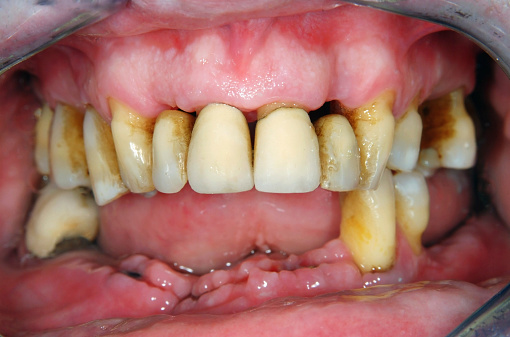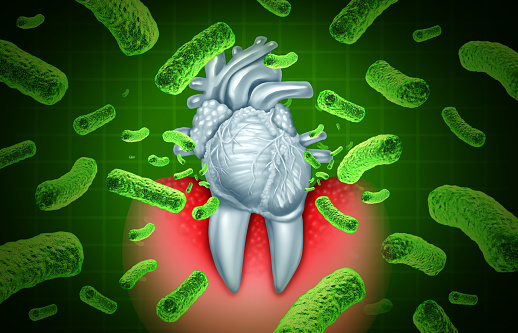One of the more surprising observations in recent years: study after study has shown that people who have poor oral health (such as gum disease or tooth loss) have higher rates of cardiovascular problems such as heart attack or stroke than people with good oral health.
Recently, dentists, researchers, and doctors have begun to examine the link between oral health and overall health. One area they’ve focused on is the relationship between gum disease and heart disease.
Gum disease, also called periodontal disease, is inflammation of the gums. It can lead to the breakdown of the gums, teeth, and bone tissues that hold them in place. Heart disease refers to a broad set of conditions, including heart attack and stroke. Heart disease is caused by the narrowing or blockage of important blood vessels.
Why would cardiovascular disease and poor oral health be connected?
A number of theories have been proposed, including:
1. Travelling Bacteria
The bacteria that infect the gums and cause gingivitis and periodontitis also travel to blood vessels elsewhere in the body where they cause blood vessel inflammation and damage; tiny blood clots, heart attack and stroke may follow. Supporting this idea is the finding of remnants of oral bacteria within atherosclerotic blood vessels far from the mouth. Then again, antibiotic treatment has not proven effective at reducing cardiovascular risk.
2. Immune Response
Rather than bacteria causing the problem, it’s the body’s immune response – inflammation – that sets off a cascade of vascular damage throughout the body, including the heart and brain.
3. 3rd/other Factors
There may be no direct connection between gum disease and cardiovascular disease; the reason they may occur together is that there is a 3rd factor (such as smoking) that’s a risk factor for both conditions. Other potential “confounders” include poor access to healthcare and lack of exercise – perhaps people without health insurance or who don’t take good care of their overall health are more likely to have poor oral health and heart disease.
Gum diseases and other diseases
Gum disease and oral health may be related to other conditions, as well, such as:
- Osteoporosis: Some research suggests that lower bone density leads to bone loss in the jaw. This may eventually lead to tooth loss due to a weaker underlying bone.
- Respiratory disease: Bacteria in the mouth can move to the lungs and cause infections such as pneumonia. This is more common for people with periodontal disease.
- Cancer: Some research suggests that gum disease may increase the risk of certain forms of cancer, such as kidney, pancreatic, and blood cancers. More research is needed in this area.
- Rheumatoid arthritis (RA): Early research shows an association between RA and gum disease. However, more research is needed.
There are also some conditions that may increase your risk of developing gum disease. Research indicates that people with diabetes are at increased risk of developing gum disease. This is likely due to increased inflammation and greater risk of infections in general. The risk lowers if you manage your diabetes.
Pregnant women are also at increased risk of gum disease due to hormonal changes and increased blood flow.
Gum disease symptoms
Regular visits to your dentist can help with early diagnosis and treatment of gum disease. You should also let your dentist know if you have any symptoms of gum disease, including:
- persistent bad breath
- swollen, red gums
- tender gums that bleed easily
- pain with chewing
- highly sensitive teeth
- receding gums or sunken teeth
- loose teeth or changes in bite
Just because you have one or several of these symptoms doesn’t mean you have gum disease. A dentist will make a formal diagnosis by reviewing the severity and duration of your symptoms.
Heart disease symptoms
If your doctor suspects heart disease, they will make a diagnosis based on your medical history, the severity and duration of your symptoms, and the results of a physical examination. The following are common symptoms of heart disease:
- chest pain, also known as angina, resulting from your heart not getting enough oxygen
- arrhythmia, also known as irregular heart beat
- shortness of breath
- unexpected fatigue
- dizziness and lightheadedness
- sudden confusion or impaired thinking
- excess buildup of fluid, known as oedema
- heart attack
The doctor will also evaluate your blood and examine risk factors for heart disease, such as family history and body weight. They can confirm a diagnosis with the following tests:
- EKG to record the heart’s electrical activity
- chest X-ray to visualise the heart and other organs in the chest
- blood tests to evaluate levels of proteins, lipids, and glucose
- stress test to document abnormal changes in your heart beat and breathing during exercise
Prevention
There are many healthy lifestyle habits you can use to maintain good oral hygiene and reduce your risk of gum and heart diseases.

Brush your teeth and tongue at least twice per day with a fluoride toothpaste. Ask your dentist to demonstrate the correct technique for brushing.

Floss between your teeth and gums at least once per day.

Use mouthwash regularly.

Only use teeth cleaning products that have the South African Dentist Association’s seal of approval.

Refrain from smoking or chewing tobacco.

Drink water that contains fluoride.

Eat a diet high in vegetables, high fibre foods, low-sugar fruits, and vegetable-based proteins.

Maintain healthy levels of blood sugar, especially if you have diabetes.

See a dentist twice per year for regular cleanings and checkups.

Be mindful of early signs of gum disease, such as bleeding gums and constant bad breath. Let your dentist know if you have any of these symptoms.
The bottom line
Whether the link is direct, indirect or coincidence, a healthy mouth and a regimen to keep it that way (including not smoking, and getting regular dental care) can help you keep your teeth. That’s reason enough to do what you can to make oral health a priority. Perhaps it will turn out to have other benefits though much of that remains speculative.
Stand by for more studies on the link between oral health and overall health. Until then, keep brushing, flossing and seeing your dentist.
References
Website: https://www.healthline.com/health/gum-disease-and-heart-disease#qampa
Website: https://www.health.harvard.edu/diseases-and-conditions/gum-disease-and-the-connection-to-heart-disease

